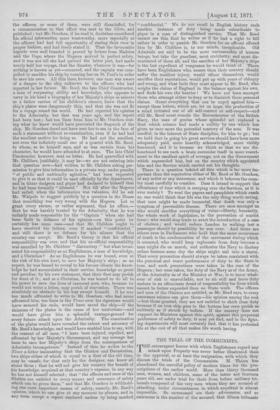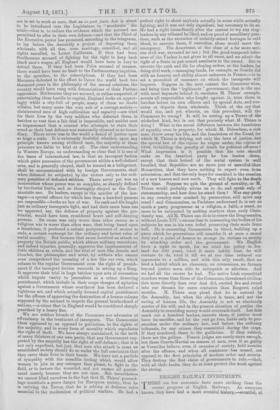THE TRIAL OF THE COMMUNISTS.
THE extravagant horror with which Englishmen regard any attack upon Property was never better illustrated them in the approval, or at least the resignation, with which they
discuss the trials of the Communists. M. Thiers has abandoned the merciful policy of modern times for the pro- scriptions of the earlier world. More than thirty thousand men, women, and children, some of the latter not fourteen years old, are under trial for their lives, before military tri- bunals composed of the very men whom they are accused of attacking, under circumstances in which acquittal is almost impossible. So envenomed are their adversarles, and so enormous is the number of the accused, that fifteen trIbunals
are to set to work at once, that an ex post facto Act is about to be introduced into the Legislature to "accelerate the trials—that is to reduce the evidence which the accused. .are ()W
permitted to offer in their own defence—and that the et of
the Executive power has promised, according to the telegrams, to lay before the Assembly a project of deporting them wholesale, with all ties, even marriage, cancelled, and all rights annulled, to Lower California. If they had been Southerners accused of fighting for the right to keep back black men's wages, all England would have been in fury to defend them. If they had been Poles accused of treason, there would have been no limit to the Parliamentary inquiries, to the speeches, to the subscriptions. If they had been Mormons defeated in the effort to throw the world back two thousand years in the philosophy of the sexual relations, the country would have rung with denunciations of their Puritan oppressors. Butbeeause they are accused, or rather suspected, of entertaining ideas hostile to capital, England looks on approv- ingly while a city-full of people, many of them no doubt villains, but many more the very salt of a corrupt society— disinterested men of high cultivation and capacity—are tried for their lives by the very soldiers who defeated them, in batches BO vast that a fair trial is impossible, and amidst men so impassioned that a counsel who attempts to state their creed as their best defence was summarily silenced as an incen- diary. There never was in the world a denial of justice upon so huge a scale. It is extremely doubtful whether, upon any principle known among civilized men, the majority of these prisoners are liable to trial at all. The clear understanding in Western Europe, an understanding so clear that it is one of the bases of international law, is that an insurgent faction which gains possession of the government within a well-defined area, and is generally obeyed, shall be treated Ecs a belligerent, shall be communicated with by foreign Governments, shall when defeated be subjected by the victors only to the ordi- nary penalties of defeated soldiers. There never yet was an insurrection whose power was so complete, so sharply defined by territorial limits, and so thoroughly obeyed as the Com- munistic one. Its leaders, except in the murder of the hos- tages—a special offence for which less than a hundred persons are responsible--broke no law of war. Its rank and file fought just as ordinary insurgents fight, and had their cause been one we approved, say, the defence of property against the pro- letariat, would have been considered brave and self-denying persons. Its cause was only worse than other causes as a religious war is worse than other wars, that being based upon a fanaticism, it produced a certain postponement of moans to ends, a certain contempt for the ordinary and better rules of social morality. But because that cause involved an attack on property the British public, which abhors military executions, and indeed injustice generally, approves the imprisonment of little children as rebels, and the trial of men like Jourde and Courbet, the philosopher and artist, by soldiers who cannot even comprehend the meaning of a law like our own, which refuses to the regular Government even the right of punish- ment if the insurgent faction succeeds in setting up a King. It approves their trial in huge batches upon acts of accusation which impute vanity to journalists as a crime deserving punishment, which include in their scope charges of agitation
against a Government whose overthrow has been declared a righteous act, and which actually demand capital punishment for the offence of approving the destruction of a bronze column supposed by the accused to impede the general brotherhood of nations,—a crime that in England would be considered sharply punished by a heavy fine. We are neither friends of the Commune nor advocates of effeminacy in the treatment of insurgents. The Communist ideas appeared to us opposed to patriotism, to the rights of the majority, and to every form of morality which repudiates the right of theft. We have always maintained, in the teeth of many thinkers of our own party, that any Government sup- ported by the majority has the right of self-defence ; that it is not only expedient, but just, that men who attack in arms an established society should do so under the full conviction that they carry their lives in their hands. We have not a particle of sympathy with the maudlin feeling which would allow women to join in any outrages they please, to fight in the field, or to torture the wounded, and yet escape all punish- ment merely because they are not men. But nevertheless we cannot blind ourselves to the fact that M. Thiess' proceed- ings constitute a grave danger for European society, that he is reviving the Terror, that he is setting at defiance rules essential to the moderation of political warfare, lie had a
perfect right to shoot anybody actually in arms while actually fighting, and it was not only expedient, but necessary to do so. He had a right immediately after the contest to try any ring- leaders by any tribunal he liked, and on proof of unmilitary prac- tices, such as the execution of unfairly-seized hostages in cold blood, to execute them, if execution alone would meet the emergency. The Americans, at the close of a far more seri- ous civil war, executed no one ; but the good-tempered toler- ance of the Yankee is not given to all races, and we admit the right of a State to put armed assailants to the sword. But to execute the rank and file for obeying orders, or the leaders for doing civil work,—managing funds, for example, as Jourde did with an honesty and ability almost unknown in France,—is to set a precedent of massacre on which the insurgents will improve. Suppose in the next contest the Commune wins, and being then the "legitimate " government, that is the one with most bayonets behind it, emulates M. Thiele' example, arrests all reopectables who fought against it, tries them in batches before its own officers and by special Acts, and exe- cutes or deports them wholesale. Think of the cry that would rise, and yet wherein, on this precedent, will the Commune be wrong ? It will be setting up a Terror of the wickedest kind, but is not that precisely what M. Thiess is doing ? What is the moral difference between the fanaticism of equality even in property, for which M. Delescluze, a rich man, threw away his life, and the fanaticism of the Usual, for which M. Thiess is defying not only the laws of justice, but the special law of the regime he reigns under, the re'giute of 1848, forbidding the penalty of death for political offences ? What impression is it possible that his acts theuld make on the fanatical party he has beaten down, except that their hatred of the social system is well founded, that Republics are no more just or merciful than Monarchies, that they have nothing to expect even from eubmission, and that the only hope for mankind is the creation of a new heaven and now earth. They will fight to the Aeatat next time. Suppose we quit the ground of morality, as M. Thiess would probably advise us to do, and speak only of statesmanship, and how does he stand then ? Was any party in any country ever crushed by persecution, still more any creed ? and Communism, as Parisians understand it, is not so much a party programme as a religion, a faith, a creed, no more to be extirpated by making martyrs than early Chris- tianity was. All M. Thiess can dole to renew the Dragonnades, without Louis XIV.'s excuse that in massacring the bodies of his subjects he was in his own belief preserving their souls from hell. He is cementing Communism in blood, building up a party which for generations will consider it at once a moral duty and a point of honour to avenge its victims on society by attacking order and the government. We English have a right to speak, for we tried his policy in Ire- land for 500 years, tried it more boldly than he will venture to de, tried it till we at one time reduced our opponents to a million, and with this only result, that we bred a hatred which no clemency, no concessions, no favours beyond justice seem able to extinguish or alleviate. And
we had all the excuse he had. The native Irish committed murders worse than those of the Commune, threatened civiliza- tion more directly than ever Assi did, carried fire and sword into our domain for more centuries than Bergeret ruled months. M. Thiess may plead that he is coerced by the Assembly, but when the object is taxes, and not the saving of human life, the Assembly is not so absolutely master of his will, and hi the present situation of parties the Assembly in overriding mercy would overreach itself. Let him mark out a hundred leaders, execute them, if justice must have its sacrifiee, and let the rest go free, liable only to pro- secution under the ordinary law, and before the ordinary tribunals, for any crimes they committed during the siege. If they murdered, there is the guillotine, if they robbed, there are the galleys. French judges are surely stern enough, but these Courts-Martial on masses of men, even if as guilty as Versailles believe, even if enemies of society, held months after the offence, and when all resistance has ceased, are opposed to the first principles of modern order and society. They destroy the first claim of governments to rule,—that, with all their faults, they do at least protect the weak against the strong.































 Previous page
Previous page